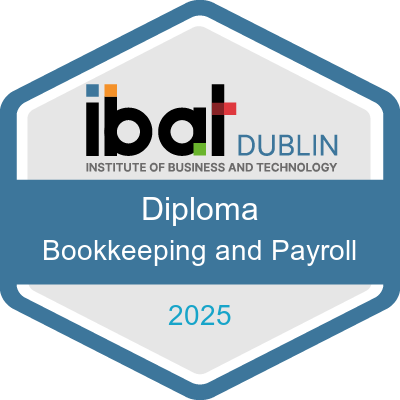- Why Bookkeeping and Payroll?
- Course Overview
- Career Opportunities
- Entry Requirements
Why Bookkeeping and Payroll?
Bookkeepers and payroll administrators are at the heart of any company. Their role can be demanding so it’s essential that anyone who wants to enter this field can handle the basics of the role, which is as much about personality as it is talent.
Bookkeepers and payroll staff do more than crunch numbers. While numerical proficiency is essential to the role, it also involves a variety of professional challenges, technical duties, and calculations. Bookkeepers and payroll staff need to be able to communicate with colleagues at all levels of the organisation and externally.
Bookkeeping and payroll jobs can quickly become demanding. Depending on the size of the organisation, these roles need individuals who can take on multiple tasks and duties at once. Working under pressure without compromising performance and good timekeeping skills are just some of the skills you’ll need to succeed in a role like this. Administrators need to be flexible and creative with their approach to finding solutions; they need to stay organised and logical and know how to communicate effectively within a team.
Processes can sometimes be stressful, such as meeting staff requests or strict compliance requirements. Bookkeepers and payroll administrators need to be diligent workers who can meet strict deadlines, deliver projects, wages, and payslips on time, and prioritise and delegate work efficiently.
This course will:
- Teach you the basics of bookkeeping
- Teach you skills consistent with the current principles and practices in the field
- Enhance your career prospects
- Develop your confidence and accuracy within Bookkeeping roles
- Give you the skills and knowledge to deal with multiple tasks at any given time
Course Overview
In order to keep finances and budgets under control, bookkeepers work closely with core business operations to ensure the most safe and economical decisions are made.
This online bookkeeping course will provide you with the ability to use Sage, a computer accounting programme, to track and record financial transactions and records for a company.
Part of the bookkeeping process also includes calculating, recording, and balancing financial reports, as well as:
- Manage Customers and Suppliers
- Entering invoices, credit notes and receipts, and payments on Customer & Supplier Accounts
- Entering Bank Payments and Bank Receipts
- Allocating credit notes and receipts
- Bank Reconciliations
- Producing reports, Trial Balance, Profit and Loss and Balance Sheet
- Backing up data and GDPR
Succeeding as a payroll administrator involves more than just delivering pay and deducting taxes, you may have to deal with multiple tasks and duties at any given time. An organised, logical approach to your work is essential, and this bookkeeping course will prepare you to undertake the standard day-to-day duties of a payroll administrator including:
- Payroll Modernisation and Real-Time Reporting
- Tracking and recording employee work hours and annual leave
- Calculating pay, taxes, and social insurance
- Incorporating variables, like overtime, sick pay, holidays and expenses
- Processing and paying salaries and wages – by cash, cheque or EFT
- Issuing payslips to employees
- Addressing problems and answering queries
- Legislative (revenue) requirements
Payroll courses like these can provide you with the knowledge, skills, and competencies required to be able to fill the payroll task in a SME and/or support the payroll function in a larger organisation.
Assessment
To be awarded the Diploma in Bookkeeping and Payroll, you will be required to complete an in-class exam for each of the two modules.
What is a Professional Diploma?
An IBAT Professional Diploma is a focused, short-duration practical course that consolidates, upskills, and/or reskills learners in a professional area. It is a stand-alone qualification that does not lead to an award on the National Framework of Qualifications (NFQ).
Course Opportunities
Possible careers within this field include:
- Accounts Payable/Receivable
- Bookkeeper
- Bookkeeper (with Accounting Technician/Accounts Administrator/Office Manager)
- Credit Controller
- Finance Assistant
- Junior Payroll Administrator
- Payroll and Bookkeeping Clerk
- Payroll Administrator/Coordinator
- Secretary/Bookkeeper
Entry Requirements
This diploma is suitable for you if you are interested in learning about, and using, computerised accounting and payroll systems. Numeracy and literacy skills are important to support your successful completion.
Why Study at IBAT Dublin?
We are Ireland’s leading enterprise-focused third level institution with a special focus on how we guide, support, and mentor our students throughout their college experience and into their working lives.
We know that employers need graduates that can hit the ground running, so we’ve tailored our courses to prepare you to do just that. And if you need an extra hand, our Academic team equipped with years of lecturing and industry experience are ready to support you both in your professional and personal development.
Diverse Programmes
Take your pick of our wide range of courses, each designed with your future in mind.
Expert Tutors
Learn from industry professionals at the very top of their game.
Flexible Learning
Life happens. We get it. Study and achieve your goals on your schedule.
Central Location
Study at one of our two campuses placed in the heart of central Dublin.
Small Class Sizes
Get one-to-one, personalised support from our tutors.

Student Testimonial
Listen as students share their reasons for choosing to study at IBAT Dublin and the benefits they’ve gained from their experience.
Study options
You can attend lectures Online or On Campus, offering maximum flexibility with your time and how you learn.
Online Study
On Campus Study
Digital Certification
A Digital Certificate will be issued upon successful completion of an in-class exam for each of the two modules, in addition, you will also receive a Digital Badge.
What is a Digital Badge?
A micro-credential is a compact credential that verifies the achievement of a skill or knowledge gained. A Digital Badge is a visual representation of having earned a micro-credential which can be shared on various online platforms to showcase the earner’s achievement.
Why have a Digital Badge?
Your Digital Badge and Certificate can be shared on social media channels such as LinkedIn and Facebook. Digital Badges can also be added to email signatures, displayed on resumes or added to recognised achievement platforms such as Badgr, Credly and OpenBadges. These are a great way to communicate your knowledge and skills, and highlight your commitment to Continuing Professional Development (CPD).









